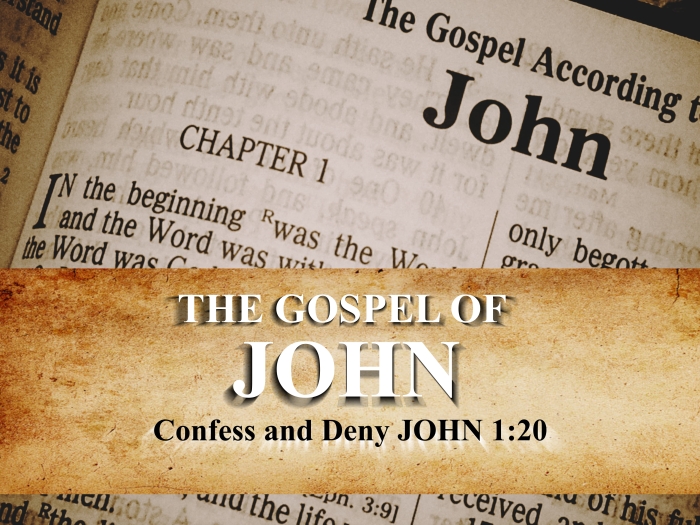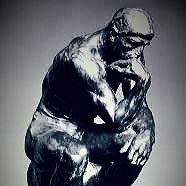20 He confessed, and did not deny, but confessed, “I am not the Christ.”
JOHN 1:20 ESV
20 καὶ ὡμολόγησεν καὶ οὐκ ἠρνήσατο, καὶ ὡμολόγησεν ὅτι Ἐγὼ οὐκ εἰμὶ ὁ χριστός.
JOHN 1:20 SBLGNT

Many of us look at this statement by John the Baptist’s reply to the Jews when they asked him, “Who are you?” in verse 19, but ironically, has anyone ever wondered why this reply?
He could have replied; he was the person that was paving the way for the one to come since that was the core of his teachings. Seeking all those to repent and prepare for the fulfilment of the Old Testament prophecies. The coming of the Messiah had been foretold and was known to the Jews. Alternatively, he could have said that he was John the Baptist.
Then why this answer, “I am not the Christ.”? Why even confess to his answer, which would have been enough.
The word ‘confess’ in greek, ὁμολογέω (homologeō), from James Swanson, Dictionary of Biblical Languages with Semantic Domains: Greek (New Testament):
vb ≡ Str 3670; TDNT 5.199—1. LN 33.274 profess, to confess allegiance (Mt 10:32); 2. LN 33.275 admit, confess, acknowledge bad behaviour (1Jn 1:9); 3. LN 33.221 declare, make an emphatic assertion (Mt 7:23; 14:7; Jn 1:20; Ac 7:17; 24:14; Tit 1:16).
Furthermore, the other keyword here is ‘deny’ ἀρνέομαι (arneomai):
Vb.; ≡ Str 720; TDNT 1.469—1. LN 33.277 deny verbal renounce knowledge or relationship (Mt 10:33; Lk 8:45); 2. LN 34.48 deny, disown, repudiate, the focus of possibly non-verbal denial (Lk 12:9), for another interpretation, see prior; 3. LN 31.25 refuse to agree, not consent to (Heb 11:24); 4. LN 30.52 disregard, pay no attention to, deny oneself (Lk 9:23); 5. LN 36.43 refuse to follow, someone as a leader (Ac 7:35); 6. LN 88.231 be false to oneself, behave in a way that untrue to one’s real self (2Ti 2:13)
The word confessed is used twice and deny, once. Two extreme conscious views, which makes us ask, is there any significance. Why did the author emphasize this statement within a literary context that seems ambiguous? He would have just said John the Baptist replied that he was John the Baptist called to pave the way for the coming Messiah.
The final keyword in this verse is ‘Christ’,
5986 Χριστός (Christos), οῦ (ou), ὁ (ho):n.pr.masc. [see also 3549]; ≡ DBLHebr 5431; Str 5547; TDNT 9.493—1. LN 53.82 Messiah a title for the Anointed One, i.e., God’s special choice (Mt 2:4; Jn 1:41; 4:25); 2. LN 93.387 Christ a proper name for Jesus of Nazareth (Mt 27:17)
John already knew why these Jews were seeking answers from him. They were inquisitive and were trying to satisfy their curiosity is this man was the Messiah, the Christ. The threat to their authority is manifested by those who sought John to repent and be baptized, rather than the temple and the old ways. Did John know what was to come, as his words seem to reflect that knowledge when he first sees Jesus in John 1:29
“29 The next day he saw Jesus coming toward him, and said, “Behold, the Lamb of God, who takes away the sin of the world!“
To take away the sin of the world, to become the lamb, and the sacrifice for all humanity. John knew and knew what the Jews had in store for Jesus later.
He confessed that he is not worth that title, and he does not deny that confession, which is reaffirmed by the author in the summing his undenial to his confession, which John the Baptist would never recant. He will never deny his confession. He was a steadfast pillar to his reasoning that would never be swayed by any secular influences, even from the authorities from the temple. His objective anchor was in God and His absolutes, and he knew his focus and role and was never going to divert from it.

The second reason was to confront the Jews with the reality of the Old Testament prophecies that Jesus is coming. ‘I am not the Christ,’ but if the Jews knew their scripture, The Baptist existence had also been foretold. In Isaiah 40: 3 –
A voice cries: “In the wilderness prepare the way of the LORD;
make straight in the desert a highway for our God.“
The Baptist reaffirms by confessing and will never deny that confession and confesses to the fact that if these Jews knew the prophecies, Jesus Christ was coming.
Isn’t it ironic that we as Christians today are bound by this same question? “Who are you?” or, more indicatively, “Who am I?”
We claim to be Christians, and we claim to be faithful to the Logos, but for anyone to claim that is without any doubt a self-righteous claim. There is no humility and submission to an objective reference, and how can anyone claim anything when the only way to judge that claim is to be god.
The true nature of what The Baptist has revealed here is the realization of who we are and what we are called to do. It is being forced into a position whereby we are called to accept something against our will. The Baptist knew precisely who he was and his role in the unfolding story. We all play a role in this vast cosmos and the struggle we have to find meaning amongst all the turmoil around us.
In the Christian worldview, that battle starts within us. Not with the world because the world will never subjugate itself to our reasoning, neither are we to subjugate ourselves to the world. The answer lies within us, and seeking that answer requires us to set aside our assumptions and presuppositions. These will only distort our view, and once these distractions are set aside including the influences around us, can we then seek answers.
The Word of God is a revelation for all the answers we need to find meaning in our life. Read and place your heart in His soverign hand, and the answers will be revealed. Many do but find nothing because their hearts are not truly focused on finding answers.
Confess and deny the World and confess our heart and soul to our Saviour
GOD BLESS


